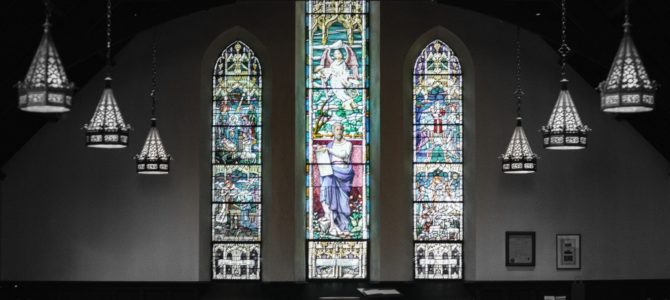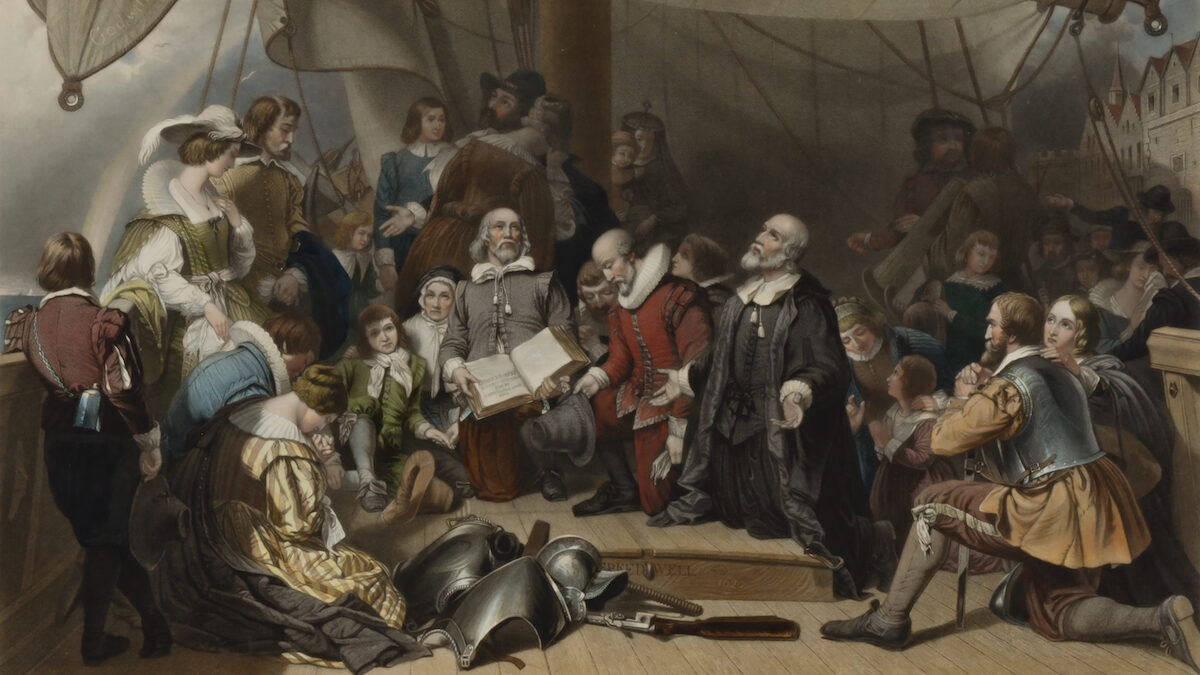
My child’s private Catholic elementary school recently welcomed a queer-promoting transgender advocate as part of its “antiracism” speaker series, declaring “diversity of identity and thought” is “a core characteristic of our Catholic faith.” The school insinuated the “transgender experience” and “defining ourselves for ourselves” can “result in more love,” and that such ideas are consistent with the sanctity of each individual as created in God’s image.
The school’s embrace of anti-Christian, Marxist critical race theory was outrageous enough. The latest attempt, however, aims to pass off as Catholic an ideology that undermines Catholic teaching on family and sexuality while blaspheming the Creator and Judge. So I decided to yank my child out of the school and find a more theologically sound learning environment.
This is the “liberal” Christianity that is corrupting our schools, universities, and churches at the hands of woke, misguided, or just poorly catechized administrators, teachers, and pastors. At its core, and under the guise of the pseudo-Christian virtues of progress and tolerance, the “liberal” Christian heresy entails the most destructive lie in the history of the church: a rejection of the self-denial and sacrifice demonstrated on the road to Golgotha.
Indeed, as such a posture distorts the very meaning of what it means to be Christian, it is the most pernicious threat confronting Christians today.
The Media’s Role Cheerleading ‘Liberal’ Christianity
Whether it’s Catholic bishops kneeling to the Black Lives Matter movement, Jesuit priests questioning the biblical condemnation of homosexuality, the Evangelical Lutheran Church of America’s election of their first transgender bishop, or Baptist pastors promoting abortion, “liberal” Christian heresy abounds. The cancerous idea that God’s law is subject to the prevailing culture has spread from politics, academia, and the corporate media, and is permeating our Christian institutions.
The ascendency of “Catholic Joe Biden” to the White House produced a flurry of media commentary gushing over the promising future of “progressive” Christianity. The New York Times kicked things off with the claim that under Biden, “a different, more liberal Christianity” is on the rise, suggesting he “has elevated his own liberal Catholicism to the center of our national life.”
An NBC op-ed rejoices that the election of candidates like Marxist sympathizer Raphael Warnock heralds a shift in American religious discourse toward social, racial, economic, and climate justice. USA Today frets that naysaying white evangelicals and mainline Catholics would likely resist attempts to realign Christian norms to reflect Biden’s “equity”-based identity politics agenda that promotes access to abortion and LGBTQ legal preferences.
These articles disingenuously pit abortion and sexual morality against poverty, racism, immigration, and the environment, juxtaposing a pesky group of anachronistic Christian “bigots” on the right with their “progressive” counterparts on the left. The message is clear: “conservative” Christianity bad; “liberal” Christianity good.
The division is illusory, however. God’s law, which flows from His perfect nature, is rational, immutable, and eternal. It doesn’t “evolve” and “adapt.” Christ’s message of repentance and redemption applies to all people and all nations across all ages.
‘The Myth of Progress’
Unfortunately, too many Christians have fallen for what Rod Dreher refers to in “Live Not By Lies” as “the Myth of Progress.” This belief, central to Marxist ideology, maintains mankind is marching ever forward toward perfect liberty, equality, and solidarity, holding that those who get in the way are ignorant, backward, and bigoted.
Wrapped up in this myth is the equally pernicious notion of “tolerance,” which — in the current context — requires one laud the doctrines and behaviors that radical ideologues approve of as moving society “forward” while mercilessly condemning the beliefs, traditions, and standards that oppose it.
The 20th-century totalitarian regimes all vowed to usher in a utopian society, yet wound up enslaving their people and committing crimes against humanity. As Dreher explains, when a biblical understanding of God is severed from the picture, so-called “progress” toward the betterment of mankind becomes a descent into chaos, depravity, and darkness.
Another factor enabling the “liberal” heresy is poor catechism and a consequentially weak grasp of Christian theology. Recent surveys reveal alarming trends. Almost one-third of evangelical Christians agree with the heretical statement that “Jesus was a great teacher, but he was not God,” and more than 40 percent believe the heretical idea that God accepts the worship of all religions. Only half of self-identified Christians believe that God is the basis of absolute moral truth, with only 37 and 43 percent of mainline Protestants and Catholics respectively holding this view.
Things are similarly confused regarding morality. One in five evangelicals believes gender identity is a matter of choice. More than half of Catholics say abortion should be legal in all or most cases, and more than 50 percent of Christians of all denominations think casual sex is sometimes or always acceptable. Forty percent of Catholics are more worried about climate change than they are about the persecution of Christians.
Given this murky picture, many Christians don’t bat an eye when CNN’s Don Lemon pontificates that “God is not about … judging people,” Georgia Sen. Raphael Warnock teaches we can “save ourselves” through helping others, and “antiracist” activist Ibram X. Kendi preaches that savior theology “breeds bigotry” and supports “racist ideals.” It’s why too few are alarmed when even Pope Francis writes that non-Christians “drink from other sources,” implying that salvation through Christ is merely one of many roads up the mountain.
Yet Christ Himself repeatedly rejected the “liberal” heresy: when Satan used the same empty promise to tempt Christ in the desert, while praying in Gethsemane on the eve of his crucifixion, and finally, at Golgotha when the Pharisees and high priests mocked Him and promised to believe in Him if He came down from the cross. What Christ demonstrated was that we must deny ourselves, carry our cross, obey God’s law, and conform to God’s will, even if this means yielding our comfort, disordered desires, safety, and yes, even our very lives.
This is the antithesis of “liberal” Christianity. The latter implies a passive and neutral deity who orders himself according to our personal definitions of reality. It promotes compromise, self-indulgence, and subjective “truth.” Vesting both the individual and man-made institutions with exclusive authority to approve moral codes and adjudicate conduct strips Christ of his role as Judge and Redeemer.
Ourselves as God
The Venerable Fulton Sheen once prophesied the conflict of the future would be between “the God who became man” and “the man who makes himself God.” While the former is grounded in the theology of the cross, the latter is based on the tyranny of individual will. Those battle lines have now been drawn and there’s no doubt which camp “liberal” Christianity is in.
The rejection of God’s creation of man and woman in His image, the attribution of evil to “oppressor” races and social structures rather than original sin, and the affront to the Author of life by relativizing the butchering of around 1 million innocent babies in the womb each year in the United States alone, is an elevation of man over the cross.
This contempt for the cross is as old as the church itself. The second-century bishop and theologian, Ireneus wrote a treatise on the heretical Christian sects that had sprung up “like mushrooms out of the ground,” and were endangering Christian life. Whether they challenged our Lord’s divinity or questioned his humanity, these heresies, each preaching their own brand of “truth,” had this in common: blasphemy of the Creator and denial of salvation through the cross.
Ireneus warned Christians against being led astray by unscrupulous players, “even as sheep are by wolves,” and urged them to avoid “an abyss of … blasphemy against Christ.” Because lies always contain a kernel of truth, they can be craftily packaged as “more true than truth itself.” This is why Satan has been referred to as “God’s Ape”: he mimics God to mislead humanity with lies. The closer the imitation of truth, the more effective the lie.
This is the grave challenge facing Christians today. Hitherto trusted institutions are exploiting biblical concepts like “sanctity of the individual” and “love of neighbor” to promote an array of highly noxious ideologies. The obsession with appearing progressive and tolerant, exacerbated by a misunderstanding of Christian theology and morality, is leaving Christians vulnerable to a disordered faith that is willing enough to embrace Jesus, but not the self-denial, sacrifice, and salvation exemplified on His cross.









